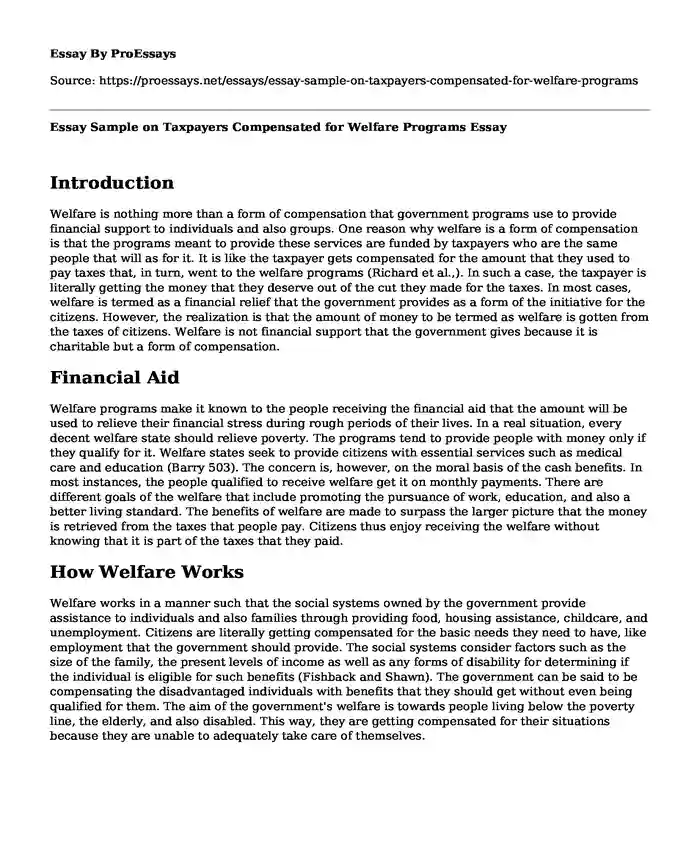Introduction
Welfare is nothing more than a form of compensation that government programs use to provide financial support to individuals and also groups. One reason why welfare is a form of compensation is that the programs meant to provide these services are funded by taxpayers who are the same people that will as for it. It is like the taxpayer gets compensated for the amount that they used to pay taxes that, in turn, went to the welfare programs (Richard et al.,). In such a case, the taxpayer is literally getting the money that they deserve out of the cut they made for the taxes. In most cases, welfare is termed as a financial relief that the government provides as a form of the initiative for the citizens. However, the realization is that the amount of money to be termed as welfare is gotten from the taxes of citizens. Welfare is not financial support that the government gives because it is charitable but a form of compensation.
Financial Aid
Welfare programs make it known to the people receiving the financial aid that the amount will be used to relieve their financial stress during rough periods of their lives. In a real situation, every decent welfare state should relieve poverty. The programs tend to provide people with money only if they qualify for it. Welfare states seek to provide citizens with essential services such as medical care and education (Barry 503). The concern is, however, on the moral basis of the cash benefits. In most instances, the people qualified to receive welfare get it on monthly payments. There are different goals of the welfare that include promoting the pursuance of work, education, and also a better living standard. The benefits of welfare are made to surpass the larger picture that the money is retrieved from the taxes that people pay. Citizens thus enjoy receiving the welfare without knowing that it is part of the taxes that they paid.
How Welfare Works
Welfare works in a manner such that the social systems owned by the government provide assistance to individuals and also families through providing food, housing assistance, childcare, and unemployment. Citizens are literally getting compensated for the basic needs they need to have, like employment that the government should provide. The social systems consider factors such as the size of the family, the present levels of income as well as any forms of disability for determining if the individual is eligible for such benefits (Fishback and Shawn). The government can be said to be compensating the disadvantaged individuals with benefits that they should get without even being qualified for them. The aim of the government's welfare is towards people living below the poverty line, the elderly, and also disabled. This way, they are getting compensated for their situations because they are unable to adequately take care of themselves.
Conclusion
Welfare is just a form of compensation for two reasons; it is directed to people with little income and that it uses the money from taxes of citizens. The outcomes of the people receiving welfare are dependent on the circumstances that caused them to apply for the benefits (Burgoon). An example is an individual that is mentally or physically disabled, who is not expected to return to normal conditions after a short time. This way, the welfare program will need to keep providing the benefits until the individual achieves better living standards.
Works Cited
Barry, Brian. "The welfare state versus the relief of poverty." Ethics 100.3 (1990): 503-529.
Burgoon, Brian. "Globalization and welfare compensation: disentangling the ties that bind." International organization 55.3 (2001): 509-551.
Fishback, Price V., and Shawn Everett Kantor. A prelude to the welfare state: The origins of workers' compensation. University of Chicago Press, 2007.
Just, Richard E., Darrell L. Hueth, and Andrew Schmitz. The welfare economics of public policy: a practical approach to project and policy evaluation. Edward Elgar Publishing, 2005.
Cite this page
Essay Sample on Taxpayers Compensated for Welfare Programs. (2023, Sep 25). Retrieved from https://proessays.net/essays/essay-sample-on-taxpayers-compensated-for-welfare-programs
If you are the original author of this essay and no longer wish to have it published on the ProEssays website, please click below to request its removal:
- Research Paper on the Current Status, Requirements, and the Future of Insurance Exchange
- The Rise of Internet Giants - Essay Sample
- Planning and Budgeting in Pharmacy Services - Paper Example
- Research Paper on Globalization Changes HR: Amazon & Beyond
- Principal-Agent Problem, Free-Rider, Balance Sheets: Examining Equity Contracts - Essay Sample
- The Great Recession: 10 Years of Economic Disparity - Essay Sample
- Employee Turnover: Causes, Challenges & Solutions - Essay Sample







